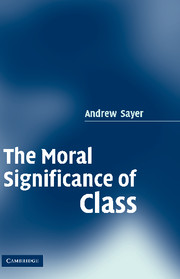Book contents
- Frontmatter
- Contents
- Preface and acknowledgements
- 1 Introduction
- 2 From the habitus to ethical dispositions
- 3 Recognition and distribution
- 4 Concepts of class: clearing the ground
- 5 Struggles of the social field
- 6 Moral and immoral sentiments and class
- 7 Responses to class I: egalitarianism, respect(ability), class pride and moral boundary drawing
- 8 Responses to class II: explanations, justifications and embarrassment
- 9 Conclusions and implications
- Bibliography
- Index
1 - Introduction
Published online by Cambridge University Press: 22 September 2009
- Frontmatter
- Contents
- Preface and acknowledgements
- 1 Introduction
- 2 From the habitus to ethical dispositions
- 3 Recognition and distribution
- 4 Concepts of class: clearing the ground
- 5 Struggles of the social field
- 6 Moral and immoral sentiments and class
- 7 Responses to class I: egalitarianism, respect(ability), class pride and moral boundary drawing
- 8 Responses to class II: explanations, justifications and embarrassment
- 9 Conclusions and implications
- Bibliography
- Index
Summary
Class is an embarrassing and unsettling subject. In many social situations it would be considered insensitive to refer to class, particularly to the class of someone to whom we are talking or who is within earshot. Unless they happen to be sociologists it is rare for people to ask others what class they are, not merely because it's usually obvious, but because it can seem rude to do so. It is significant that when we do mention it we generally use the euphemisms of ‘working’ class for lower class and ‘middle’ to include upper class. The embarrassment reflects the morally problematic nature of class, deriving from the fact that people's life-chances and who they become are strongly influenced by the accident of their natal class and the inequalities which follow from this. While we may want to say that class should not be seen as having anything to do with worth, this only makes the existence of class inequalities more troubling: how is it that our life-prospects, be they bleak or bright, have so little to do with what we need or deserve? Such questions are posed by the everyday experience of class, especially our relations with others of different classes.
Class matters to us not only because of differences in material wealth and economic security, but also because it affects our access to things, relationships, experiences and practices which we have reason to value, and hence our chances of living a fulfilling life.
- Type
- Chapter
- Information
- The Moral Significance of Class , pp. 1 - 21Publisher: Cambridge University PressPrint publication year: 2005



